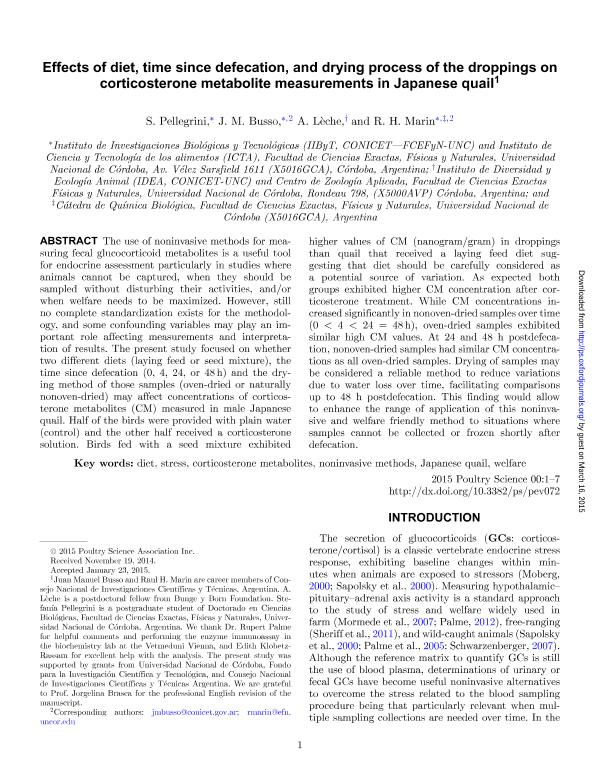Artículo
Effects of diet, time since defecation and drying process of the droppings on corticosterone metabolite measurements in Japanese quail
Fecha de publicación:
05/2015
Editorial:
Poultry Science Assoc Inc
Revista:
Poultry Science
ISSN:
0032-5791
e-ISSN:
1525-3171
Idioma:
Inglés
Tipo de recurso:
Artículo publicado
Clasificación temática:
Resumen
The use of noninvasive methods for measuring fecal glucocorticoid metabolites is a useful tool for endocrine assessment particularly in studies where animals cannot be captured, when they should be sampled without disturbing their activities, and/or when welfare needs to be maximized. However, still no complete standardization exists for the methodology, and some confounding variables may play an important role affecting measurements and interpretation of results. The present study focused on whether two different diets (laying feed or seed mixture), the time since defecation (0, 4, 24, or 48 h) and the drying method of those samples (oven-dried or naturally nonoven-dried) may affect concentrations of corticosterone metabolites (CM) measured in male Japanese quail. Half of the birds were provided with plain water (control) and the other half received a corticosterone solution. Birds fed with a seed mixture exhibited higher values of CM (nanogram/gram) in droppings than quail that received a laying feed diet suggesting that diet should be carefully considered as a potential source of variation. As expected both groups exhibited higher CM concentration after corticosterone treatment. While CM concentrations increased significantly in nonoven-dried samples over time (0 < 4 < 24 = 48 h), oven-dried samples exhibited similar high CM values. At 24 and 48 h postdefecation, nonoven-dried samples had similar CM concentrations as all oven-dried samples. Drying of samples may be considered a reliable method to reduce variations due to water loss over time, facilitating comparisons up to 48 h postdefecation. This finding would allow to enhance the range of application of this noninvasive and welfare friendly method to situations where samples cannot be collected or frozen shortly after defecation.
Palabras clave:
Diet
,
Stress
,
Corticosterone Metabolites
,
Non-Invasive Methods
Archivos asociados
Licencia
Identificadores
Colecciones
Articulos(IIBYT)
Articulos de INSTITUTO DE INVESTIGACIONES BIOLOGICAS Y TECNOLOGICAS
Articulos de INSTITUTO DE INVESTIGACIONES BIOLOGICAS Y TECNOLOGICAS
Citación
Pellegrini, Stefanía; Busso, Juan Manuel; Leche, Alvina; Marin, Raul Hector; Effects of diet, time since defecation and drying process of the droppings on corticosterone metabolite measurements in Japanese quail; Poultry Science Assoc Inc; Poultry Science; 94; 5; 5-2015; 1068–1074
Compartir
Altmétricas




